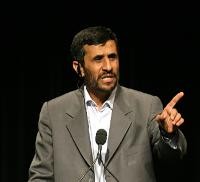The recent Iranian election fiasco has been a blessing in disguise for President Mahmoud Ahmadinejad. His reelection was confirmed by Supreme Leader Ali Khamenei, the vote count was ratified by the Council of Guardians, and the presidential oath of office was taken in front of a majority of parliamentarians. Consequently, while those officials may object to his actions, their ability to counter them is limited. If Ahmadinejad fails, so, too, will they for having sanctioned his authority.
But in order to hold any public position in the future -- and he can be elected to a third, nonconsecutive, presidential term -- Ahmadinejad needs to regain the confidence of Iran's people, because he cannot count on another clerically engineered miracle.
Sources in Iran indicate that, faced with mounting demands of loyalty from the hardliners who brought him back to power, Ahmadinejad is instead exploiting their public weaknesses and internal schisms to assert his independence. Yes, hardliners did prevail in their demands that First Vice President Esfandiar Mashaie step down, after reports surfaced of his being conciliatory towards Israel. But Ahmadinejad promptly reappointed Mashaie to the rank of presidential chief of staff, despite protests from Khamenei and other fundamentalist clerics.

